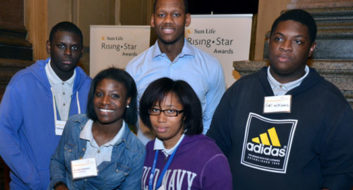How to Foster the Next Generation of Entrepreneurs
Posted by | February 6, 2012
 Entrepreneurs are vital to innovation. Thomas Edison, Steve Jobs, Berry Gordy, Jr., and Mark Zuckerberg—to name a few—all reshaped the world with their ideas. With so much history to draw from, the next generation of entrepreneurs can gain a head start by learning best practices that help them succeed where failed businesses did not. And with programs like NFTE Philadelphia, even young entrepreneurs can learn the skills to change history as part of their high school education.
Entrepreneurs are vital to innovation. Thomas Edison, Steve Jobs, Berry Gordy, Jr., and Mark Zuckerberg—to name a few—all reshaped the world with their ideas. With so much history to draw from, the next generation of entrepreneurs can gain a head start by learning best practices that help them succeed where failed businesses did not. And with programs like NFTE Philadelphia, even young entrepreneurs can learn the skills to change history as part of their high school education.
At NFTE, we’re dedicated to finding students with an entrepreneurial spirit and giving them the resources to put their ideas into action. Oftentimes, our students have a wonderful street sense that is an innate advantage for entrepreneurs. Our goal is to convert those instincts into businesses and transform students into empowered leaders.
Of course, that’s not easy. At NFTE, we combine an exciting curriculum with experimental practice in order to bring the real world into the classroom. Volunteers with a variety of relevant business and leadership backgrounds speak to our classes and coach the students as they develop their ideas. Trips to business offices and local colleges give students concrete examples of the potential for their skills and ideas.
After serving thousands of students, we have a unique perspective on how to motivate these future innovators. Here are four key steps for teaching the next generation of entrepreneurs:
- Encourage their dreams. This might sound hokey, but when I talk to students about their ideas, I like to look for the sparkle in their eyes. Many of the students already have passionate ideas for businesses and just need someone to take them seriously. When students get positive feedback, they respond. Whether they want to bake cakes or mow lawns, we validate those ideas and tell students yes, they can build a successful business around their interests.
- Help implement their ideas. Part of taking their ideas seriously is giving them the resources to put their business plans into action. Our great volunteers and business leaders, like Michael Pearson, the speaker at last Friday’s Youth Entrepreneurship Conference, teach the students financial literacy, components of good management, and even how to create an elevator pitch. Getting a start-up business from idea to real world company is difficult, but our team of volunteers supports students with those first steps.
- Teach them to network. Networking is a key for successful entrepreneurs. Once their company is off the ground, students can use their network to find employees, gain support, or explore new markets for their products and services. At our NFTE Philadelphia Visionary Gala, we invited 30 students to join us and talk to guests about their businesses. This is great training for students in how to market themselves and their company, as well as build contacts they may need in the future.
- Model failure as an opportunity. If you try to start a business, you are going to have to overcome obstacles, potentially even some failures. The real entrepreneurs plow through challenges and learn from them. This concept might be hard for our students to grasp in the context of running a business. In many cases, they have experienced challenges in their lives, and they already know how to learn from their experiences. That’s an invaluable skill for them to have as they start their businesses.
As part of the experiential component of their education, 120 of our students attended our annual Youth Entrepreneurship Conference at the Community College of Philadelphia (CCP) last Friday, which featured two prominent speakers. Dr. Wayne Wormley, Dean of the Business and Technology Division at CCP, delivered a call to action in his opening remarks. Michael Pearson, President of Union Packaging, spoke to the children about his career and how he successfully started his own packaging manufacturing business.
The conference also featured workshops in networking, insurance, financial statements, and information technology to help familiarize students with the fundamentals of running a business. With encouragement, practical skills, and the right mindset, our students could be the next big innovators. We can’t wait to see them get their start-ups off the ground!

NFTE students packed the room to hear our keynote speaker Michael Pearson. Photo Credit: © Daniel Burke Photography.

Michael Pearson tells NFTE students his story of start-up success. Photo Credit: © Daniel Burke Photography.



